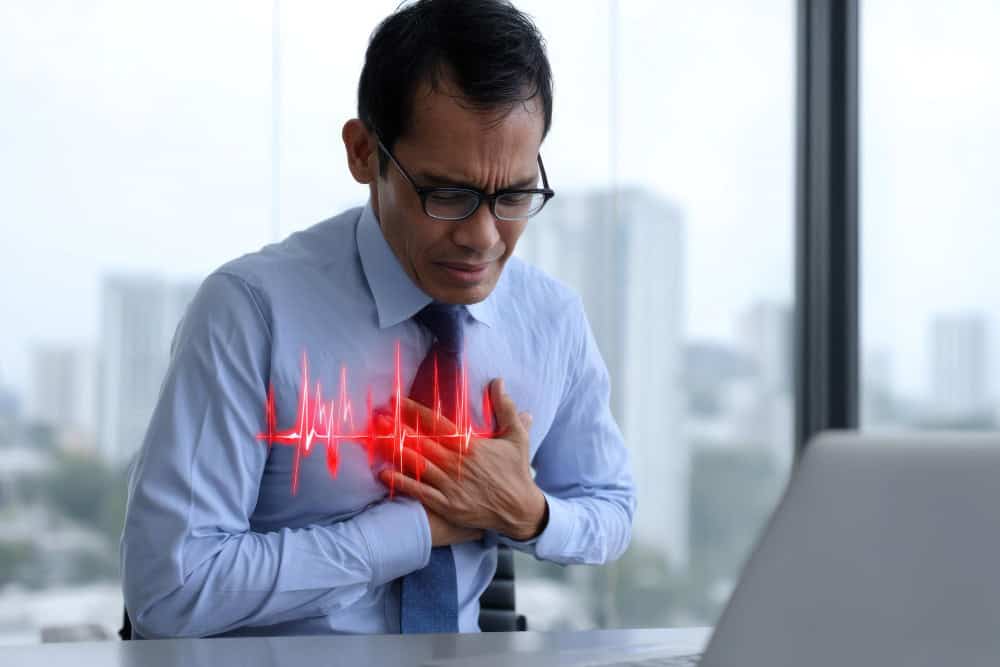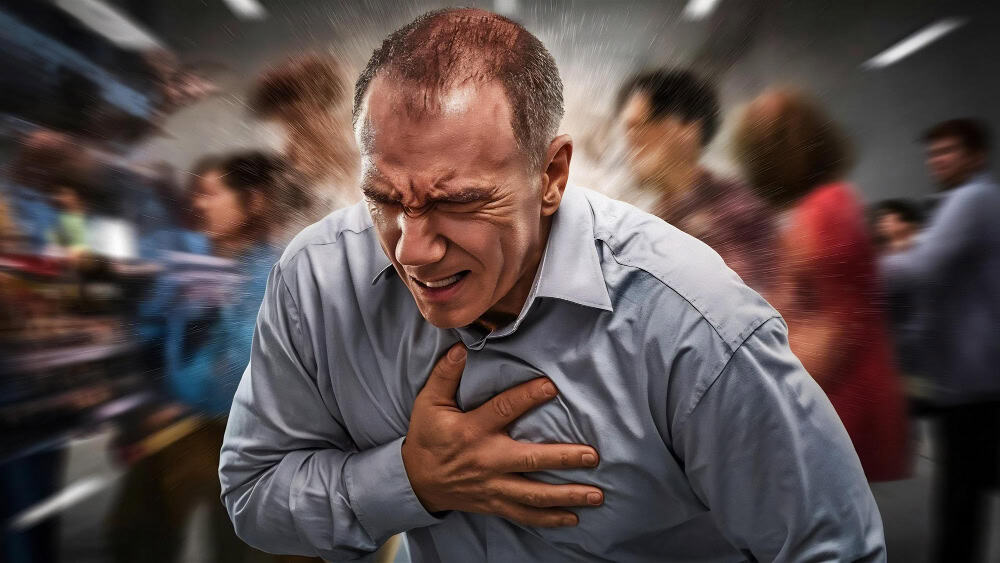Unlike in Western countries, where heart-related problems usually appear later in life, Indians are facing all of these problems almost a decade earlier[1]. While genetics plays a role, lifestyle habits such as excessive stress, prolonged sitting, lack of physical activity, and diets high in unhealthy fats contribute to the issue. All of these factors, plus very little awareness and late detection, make heart disease a leading cause of premature deaths in India. [2]
Support your heart with the right care. Explore our heart health essentials to keep your heart healthy and happy.
What makes things worse is that many people still confuse cardiac arrest with a heart attack, when in fact they are two distinct medical emergencies. A heart attack occurs due to the blocked blood flow in the heart, whereas cardiac arrest is more of an electrical failure, where the heart suddenly stops working. Cardiac arrest vs heart attack can be hard to differentiate, but once done, we can choose the right path of response.
Factors That Affect Heart Health In Indians
 Heart disease hits harder in India due to the combined influence of genetic factors, as well as the way we live today.
Heart disease hits harder in India due to the combined influence of genetic factors, as well as the way we live today.
1. Inherited Risk:

Indians are genetically predisposed to conditions like high cholesterol, central obesity, and diabetes, all can increase the risk of heart problems. Research shows that Indians tend to develop blockages at a younger age, and that too in small arteries, making them more vulnerable. [3] While genes set the stage, lifestyle factors often decide what condition occurs and how severe it becomes.
2. Early Onset:

In Western countries, where heart-related problems occur after 55 or 60, Indians experience them at a lot earlier stage of their lives. Doctors regularly report patients in their 30s-40s with severe heart conditions. This early onset makes the cardiac arrest vs heart attack even more urgent to discuss, as many younger individuals don’t even know about it until it’s very late.
3. Unhealthy Diet Patterns:

A shift from the traditional indian diet to high-sugar, high-fat, and processed foods has significantly contributed to obesity, hypertension, and diabetes of which are major causes of heart-related conditions. This makes it crucial to pay attention to not only what you eat but also how it can affect long-term risks.
4. Diabetes Epidemic:

India is often called the diabetes capital of the world, and diabetes is one of the major risk factors of cardiovascular diseases. Type 2 diabetes and prediabetes are strongly linked to heart disease because they damage blood vessels and increase the risk of hypertension and high cholesterol. Alarmingly, many Indians develop diabetes at a younger age, which compounds lifetime heart risk.
5. Modern Lifestyle:

Modern living has brought convenience, but it has also multiplied our stress levels. Long working hours, sitting desk jobs, smoking, irregular sleep, and constant screen exposure contribute to heart health. So understanding cardiac arrest vs heart attack is vital here, as stress can act as a trigger for either of the conditions.
6. Low Awareness and Late Diagnosis:

A major challenge is that heart disease often goes unnoticed until severe symptoms appear. Many people avoid regular health checkups, leading to late diagnosis of hypertension, diabetes, or cholesterol issues. By the time intervention happens, damage may already be advanced.
At Tata 1mg, we bring you practical tips on diet, exercise, lifestyle changes, early warning signs, and preventive care that can truly make a difference in keeping your heart strong. Explore the page and take a pledge to protect your heart health today.
Understanding Cardiac Arrest Vs Heart Attack

Let’s break down heart attack and cardiac arrest in simple, practical terms.
A heart attack, also known as a myocardial infarction, occurs when blood flow to the heart muscle is blocked. This is usually due to a clot in the major heart arteries. Without oxygen-rich blood, that part of the heart muscle begins to die.
A cardiac arrest is far more abrupt. It occurs when the heart suddenly stops beating properly due to a malfunction in the heart’s electrical system. This causes the heart to stop pumping blood to the brain and other vital organs.
Do Heart Attack and Cardiac Arrest Feel the Same?
While they both affect the heart, the symptoms and the urgency can be very different. Here’s how to tell them apart:
Symptoms of a heart attack include:
- Chest pain
- Discomfort like pressure, tightness, or squeezing
- Pain radiating to the arm, jaw, back, or neck
- Shortness of breath
- Sweating, nausea, or dizziness
- Fatigue or lightheadedness
Symptoms of cardiac arrest include:
- Sudden collapse
- No pulse or breathing
- Loss of consciousness
- Unresponsiveness, even with shaking or shouting
- Gasping or abnormal breathing
Heart attacks and cardiac arrests are often connected! One can lead to the other, though many other conditions can also trigger cardiac arrest. If you notice any symptoms or have concerns about your heart, consult a professional promptly to get the right diagnosis and care for any heart disease.
What to Do During a Heart Attack [4]
- Call the emergency ambulance service immediately.
- Do not self-drive
- Go to the nearest hospital with a cardiology unit or emergency care
- Keep calm, sit down, and rest while help arrives.
What to Do During Sudden Cardiac Arrest [4]
- Check if the person is responsive and breathing
- Call 108 for immediate emergency assistance
- Start CPR immediately – push hard and fast on the chest (100–120 compressions per minute).
Knowing the difference could save a life. But what about protecting your own heart? Stay proactive about your heart health. Book a comprehensive Heart Health Package today and take the first step toward prevention and peace of mind.
Book Your Test Now
Recommended Reads:
The 3-3-3 Japanese Walking Routine For A Stronger Heart
Did You Know? Just 3 Nights of Insufficient Sleep May Damage Your Heart
FAQs
Q. What is cardiac arrest vs heart attack?
A heart attack happens when blood flow to the heart is blocked, whereas cardiac arrest happens when your heart suddenly stops beating. One is a circulation problem, while the other is an electrical problem.
Q. What is more serious, a heart attack or a cardiac arrest?
A heart attack is caused by blocked blood flow to the heart, but the heart usually keeps beating. A cardiac arrest means the heart suddenly stops. Therefore, a cardiac arrest is more immediate and life-threatening, but both conditions need urgent medical attention.
Q. Why is cardiac arrest so common in India?
High rates of diabetes, obesity, hypertension, and lack of timely medical care increase the risk in India.
Reference
1. Kumar AS, Sinha N. Cardiovascular disease in India: A 360-degree overview. Medical Journal Armed Forces India. 2020;76(1):1-3. doi:10.1016/j.mjafi.2019.12.005
2. Gupta R, Mohan I, Narula J. Trends in coronary heart disease epidemiology in India. Annals of Global Health. 2016;82(2):307. doi:10.1016/j.aogh.2016.04.002
3. Premature coronary artery disease in North India: an angiography study of 1971 patients. PubMed. https://pubmed.ncbi.nlm.nih.gov/16350676/. Published August 1, 2005.
4. Available online at https://www.heart.org/en/health-topics/heart-attack/about-heart-attacks/heart-attack-or-sudden-cardiac-arrest-how-are-they-different
(The article is written by Sneha Jajoo, Intern, Clinical Health & Content, and is reviewed by Dr.Subita Alagh, Assistant Team Lead, Disease Content.)
